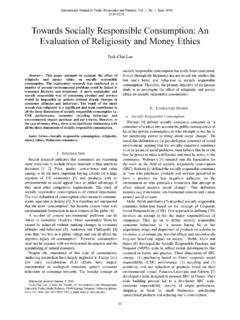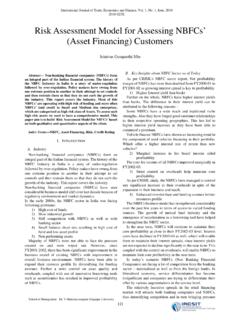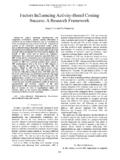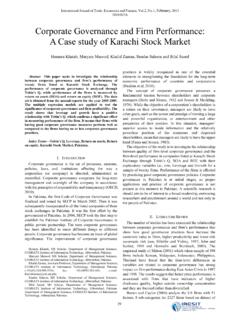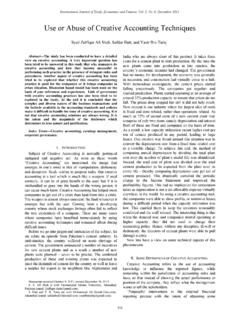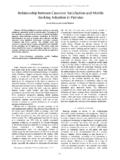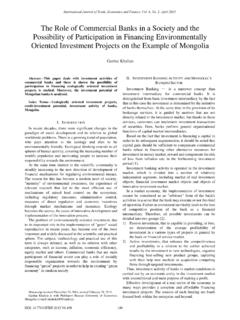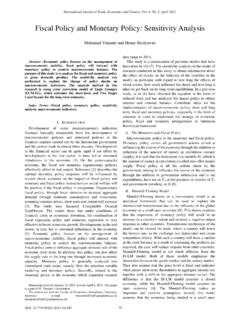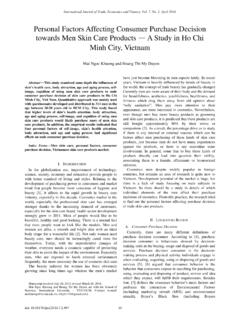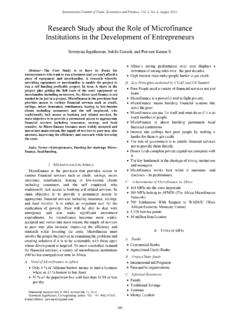Transcription of Protectionism and Free Trade: A Country‘s Glory or …
1 International Journal of trade , Economics and Finance, Vol. 3, No. 5, October 2012 Abstract This paper does not only go over the ground of the generally traversed, and examined arguments commonly used, but, it carries the inquiry further than the controversialists on either side, yet ventured to go; also a sought to discover why protection retains such popular strength in spite of all exposures of its erroneous beliefs; to trace the connection between the tariff question and more important social questions, now rapidly become the "burning questions" of our times; and now to show what radical measures the principle of free trade logically leads to.
2 Thus harmonizing the truths which free traders perceive with the facts that protectionists make their own theory plausible, it s perceived that this might open ground upon which those separated by seemingly irreconcilable differences of opinion may unite for that full application of the free - trade principle which would, secure both the largest production and the fairest distribution of wealth. Also facts emanating a posteriori will contain the general viewpoint of a country s recommended choice, as well as my view point. Index Terms free trade , Protectionism , Glory (advantages), Doom(drawback), industries, taxes, import/export, case study(on economic growth).
3 I. INTRODUCTION free trade is a system in which the trade of goods and services between or within countries flows unhindered by government-imposed restrictions and interventions. Interventions include taxes and tariffs, non-tariff barriers, such as regulatory legislation and quotas, and even inter-government managed trade agreements such as the North American free trade Agreement (NAFTA) and Central America free trade Agreement (CAFTA) (contrary to their formal titles.) free trade opposes all such interventions. One of the strongest arguments for free trade was made by classical economist David Ricardo in his analysis of comparative advantage explains how trade will benefit both parties (countries, regions, or individuals) if they have different opportunity costs of production.
4 Protectionism , in the other hand is an economic policy of restricting trade between nations. trade may be restricted by high tariffs on imported or exported goods, restrictive quotas, a variety of restrictive government regulations designed to discourage imports, and anti-dumping laws designed to protect domestic industries from foreign take-over or competition. II. PROTECTION OF HOME INDUSTRIES IN DISFAVOR OF FOREIGN GOODS Manuscript received July 22, 2012; revised August 25, 2012. Regine Adele Ngono Fouda is with Shanghai Maritime University, China(e-mail: Protectionism , an economic policy of restraining trade between nations, through methods such as tariffs on imported goods, restrictive quotas, and a variety of other restrictive government regulations is designed to discourage imports, and prevent foreign take-over of local markets and companies.)
5 This policy is closely aligned with anti-globalization. This term is mostly used in the context of economics; Protectionism refers to policies or doctrines which "protect" businesses and "living wages" within a country by restricting or regulating trade between foreign nations. Adam Smith famously warned against the 'interested sophistry' of industry, seeking to gain advantage at the cost of the consumers. Virtually all modern day economists agree that Protectionism is harmful in that its costs outweigh the benefits, and that it impedes economic growth. A lot of situations made it possible that the international world called upon a general meeting to try to solve this crisis.
6 This was true in 1947 when the General Agreement on Tariff and trade (GATT) was signed with objectives of encouraging international trade , and reducing tariff as possible. [1] A. A country s Protectionism : Blooming Glory A country s Protectionism will mean the protection of home industries or infant industries (until they are large enough to achieve economies of scale and strong enough to compete internationally.), producers and consumers. The fundamental of internal trade wouldn t involve trade activities across national borders. Therefore this will reduce the special problem which often subsequently arise during import and export; crisis such as, deals might have to be transacted in foreign languages, foreign laws customs and regulation ( Protectionism frees such trauma).
7 Moreover, information from particular firms needed in order to trade might be difficult to obtain, as well as the exporting countries numerous cultural differences may have to be taken into account when trading. All these complicated tribulations rendered a lot of countries to think twice by staying at home and enjoying home industries goods and products, denying therefore to practice import and export. Furthermore, having to export products from foreign countries will mean taking into consideration its currency; worst of all if the exchange rate variation is wider than the protectionist ( country ).
8 Therefore such situation will create an exposure of taking debts to fulfill the contract (partnership agreement) of import and export, Cameroon in its thirst of practicing import/export, is always stock in currency transaction, forcing it to take debts from the world bank in order to keep the agreement moving, or else will have to face a penalty of breach of contract . Also, there is a greater political risk (such as the imposition of restriction on imports etc); commercial risks are broad too, such as markets failure, products not appealing to foreign customers as it s the case of many goods nowadays in foreign Protectionism and free trade : A country s Glory or Doom?
9 Regine Adele Ngono Fouda 351 International Journal of trade , Economics and Finance, Vol. 3, No. 5, October 2012352 soils; more again, there are financial risks, such as adverse movement in exchange rates; and finally, transportation risks. B. Protectionism As A Fatal Failure: The Doom. No nation has all of the commodities that it needs. Some countries are abundant in certain resources, while others may lack them. For example, Colombia and Brazil have the ideal climate for growing coffee beans. The US is a major consumer of coffee, yet it does not have the suitable climate to grow any of its own.
10 Consequently, this has made Colombia and Brazil big coffee exporters and the US big coffee importer. In this case, if the US were practicing Protectionism , then they can t import coffee; this is true too for Cameroon, producer of cocoa and France consumer. In short, the uneven distribution of resources around the world would not give room for Protectionism . Moreover, a country might claim that it has more than enough particular items to meet its needs and enough technology to manufacture or transform its natural products, however, this country might be consuming more than it can produce internally and thus will need to import from others depicting equilibrium in trade .
